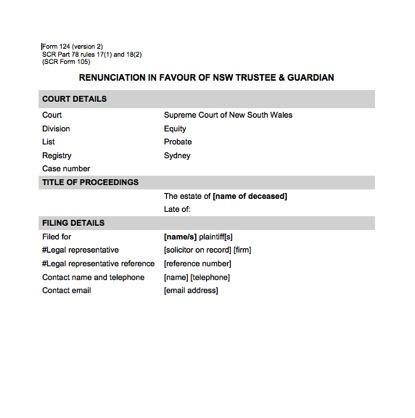Can an executor of NSW apply for probate? What is renunciation in New South Wales? What does it mean to renounce probate? When an application for a grant of representation is made the renunciation should be filed as an exhibit to the affidavit of the applicant.
This is the actual form with sample text added in each section. It is common that a person is appointed both an executor and a trustee in the will. In New South Wales , Queensland and most other jurisdictions the same renunciation form covers renouncing the right to all trusts, powers and authorities expressed by the will, as well as renouncing the right to probate. Inter-meddling in the estate. Generally the court won’t accept an executor’s renunciation of.
Before renouncing the executor should check the wording of the will in order to make sure that another person is entitled to take their place. Once a grant has been made an executor cannot renounce probate and must not delegate their executorial duties to another person. An appointed executor or administrator may however, by dee appoint the NSW Trustee and Guardian or a trustee company to be executor or administrator in their place or as co-executor or administrator.

The renunciation does not confer the right to a grant of probate on another person. If other executors have been named in the will, the remaining executors can apply for probate (as long as the will does not specify a particular number of executors ). Fill in either form PAor PAif you want to give up your legal responsibility and role permanently (also known as ‘renunciation’) to apply for probate to manage the estate of someone who died. When someone has been appointed as an executor and wishes to renounce the role. If you have been nominated as an executor , you do not need to accept. There is no legal obligation to agree.
UCPR forms numbered 1to 1inclusive are approved for use in probate cases. Renouncing Probate Sometimes it is sensible for an executor to decline to take on the role even though they have been named in the will. The most common reason is in relation to those wills where a parent has appointed all of their children as executors, but some of them live interstate or overseas. I have not intermeddled in the estate of the deceased.
You should do this as soon as you can, because your renunciation may not be effective if you have completed even some of the executor’s duties. A solicitor can help you do this. A renunciation is a document whereby the executor relinquishes the title to the grant. An individual can step down without stating a reason prior to formal appointment by the court. This is known as renunciation and is a legal document providing the person named in the will is not going to act as executor.
The document is signed and filed after the testator's passing and prior to formal appointment by the court. Trustee and Guardian charge for their services. The amount they charge depends on how complex the estate is and what services you are asking for. Renunciation must be absolute, that is, without contingency.
Put simply, this involves making sure their debts are paid and that their assets and possessions go where the deceased wanted them to. The Supreme Court of New South Wales only has jurisdiction if the deceased left assets in New South Wales. A grant of probate will not be made if the deceased had no assets in New South Wales.
If a deceased person owned assets in more than one state or country it may be necessary to apply for a grant in each place where assets were located.
No comments:
Post a Comment
Note: only a member of this blog may post a comment.